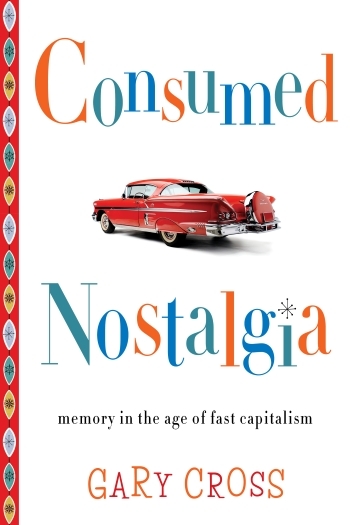Memory in a World of Fast Capitalism — Gary Cross
“We all live in and are shaped by a world of fast capitalism, and therefore of consumed nostalgia, but we need not be consumed by it.”—Gary Cross
In this excerpt from the conclusion to Consumed Nostalgia: Memory in the Age of Fast Capitalism, Gary Cross examines how our fascination with and fetishization of consumer goods from our youth both enhances and distorts our understanding of the past and the ways in which memory brings us together and divides us:
It’s clear that for practically all of us, memory requires things of memory. But these things are means that become ends, that is, fetishes or projections of ourselves. They can and should, I think, instead be instruments to reach fresh insights and understandings. Ultimately, is this not what a collection of old toys or watching old TV should do for us?
This can happen when we use things of memory to engage with the past but not regress into the past, especially into a childhood of lost adventure and/or simplicity. If we converse with that past, bring a full and honest consciousness of our present lives into the encounter with what has gone before, nostalgia can reveal something about ourselves now. And through “repetition”—going back to where we came and thus to whom we have been—we can make our understanding of ourselves clearer and more accurate. This may happen if we are willing to let that past tell us something we hadn’t expected, to allow a new standpoint to emerge.36 Such a return might even lead to an acceptance of self (finally getting over our obsessions with the pains and resentments that go along with many childhoods or longings to return to the good ol’ days), and there is no reason why it might not also lead to what the famous psychologist Erik Erikson called “ego integrity,” a self at peace with its past selves.
But again this will take place only if we allow those objects of memory to go beyond their materiality and to tell us something about our relationships. I repeatedly saw the revered old car or toy (especially in men) disguise a shared experience with a dad or brother, positive or not. But this need not be the case. Returning to a teenage memory through the teenage car can lead to a deeper self-understanding. And what we may learn about our relationships may take us beyond the tribalism of modern consumption.
This requires that we stand back from our memories, not claim that “our song” is better than the next person’s, and instead appreciate a shared pathos and humanity. Another aspect of this “disengagement” is the need to resist the temptation to deny what has truly gone (so evident in the illusion of possessing the past in collections or in recreating an “authentic” historical event or mood)—even as we may playfully enjoy a regression now and then into that past. And to recognize the pastness of the past allows us to see the past more “objectively,” not as an extension or fulfillment of our self-image today but instead to recognize what is gone and why.
All of this, of course, doesn’t condemn nostalgia. Recollecting the past (or “reconsuming” it) often offers a desirable alternative to the ephemerality of the everyday experience of fast capitalism. But by adopting a less burdened, more positive nostalgia, we can see the past differently—not just from when it was our present—but also differently from the last time we visited it. This, we may find, is what can happen when we see TV reruns.
This positive meaning of repetition can also be a function of the reunion. For fifteen years, two friends from college and I have met for two days every August. It is a ritual, and maybe even an obsession, but each year is different. Some years, we talk about a recent change in one or more of our lives—children, marriages, careers; other years, we recall shared memories of college, youth, etc. But the “repetition” of old songs, movies, TV shows, and theme parks can do the same thing, especially if they aren’t “reconsumed” too often (a problem for the obsessive collector or for those who will listen only to channel 6 on satellite radio). And this nostalgia can be positive even in the seemingly obsessive collection of the toys of youth. Jeffrey Hammond demonstrates this in his reverie on his homey collection of Marx toys from his 1950s childhood. He weaves his recollection of Roy Rogers and Dale Evans (and their toy figures) with memories of his father; he recalls his boyhood enchantment with dinosaur figures, which compensated for his childish fear of animals. He goes beyond his personal experience as he comes to understand how the world has changed since the days of American triumphalism, when Louis Marx made cowboy and Indian figures celebrating the conquests of the white man. He shows how his playful interlude into a world that has disappeared has helped him understand himself better and grow emotionally as a sixty-year-old man. His obsession with his desktop of toys turns out to be not an escape into immaturity but an encounter with memory that contributes to a new stage of maturity.
If memory work needs to transcend fetishism and self-isolation, it should also require us to look in the past for a world less familiar than our childhoods. This may not only mean engagement with the challenging distant past, of which we have no personal memory, but also with those things that we missed during our formative years (not “our” oldies or sitcoms but perhaps our parents’ or older siblings’ music and movies). Even more, we might consider recalling those periods of our lives that may not be so wondrous or exciting; returning to places and people that shaped our later lives to seek an understanding of what happened and why since the “golden years” of our youth. Such a memory journey can help us realize both that we can never go back but also that a voyage into the past can help us learn from what is left and what is not. All this might lead us to abandon some of our delusions. It might also offer us new insights and perhaps delights as we take on a wider view of the past and see it from new perspectives. We also may want to find ways of making memory less isolating, less about “me,” and perhaps more about a renewal of lost relationships and the creation of new ties across generations. Even more, perhaps we may need to readjust just what we should recall and where and when we need to forget. Like so many other commodities, consumed memory satisfies many of our longings, but it may reveal needs that things purchased can never deliver.
I might argue that we should try to engage our memories beyond the consumer culture in reunions with long-lost friends, especially if we avoid bragging about the accomplishments of our lives. About ten years ago, I found it extraordinarily meaningful to return to the little town I lived in as an elementary-school child where, to my surprise, I met several people who remembered me. I realized that I couldn’t go home, but I learned about myself and why I was so nostalgic about that small place. Some day I plan on rereading some of the books that I read and commented on in the margins when I was in college; I am even contemplating going to my fiftieth high-school reunion. And I visit heritage sites wherever I travel. These are all alternatives to commodity nostalgia, but there is no reason to insist on their necessary superiority.
My journey across the nostalgic worlds of today’s consumer culture has made me recognize much more about why many of us collect the goods or return to the media of our childhoods. I’ve come to the conclusion that consumed nostalgia can work if it means psychological and cultural growth, if it transforms or calls into question our identities. Packaged memory can give new meanings to the past, provide us with new perspectives on growing up in the 1950s or 1990s, and sometimes free us from old resentments and distortions. But consumed nostalgia only points in that direction; it can easily short-circuit the potential of recollection. Memory can and might well go beyond our recollection of commercialized life, no matter how central it may be to our past lives. We can find triggers of recollection in many other places. We all live in and are shaped by a world of fast capitalism, and therefore of consumed nostalgia, but we need not be consumed by it.




